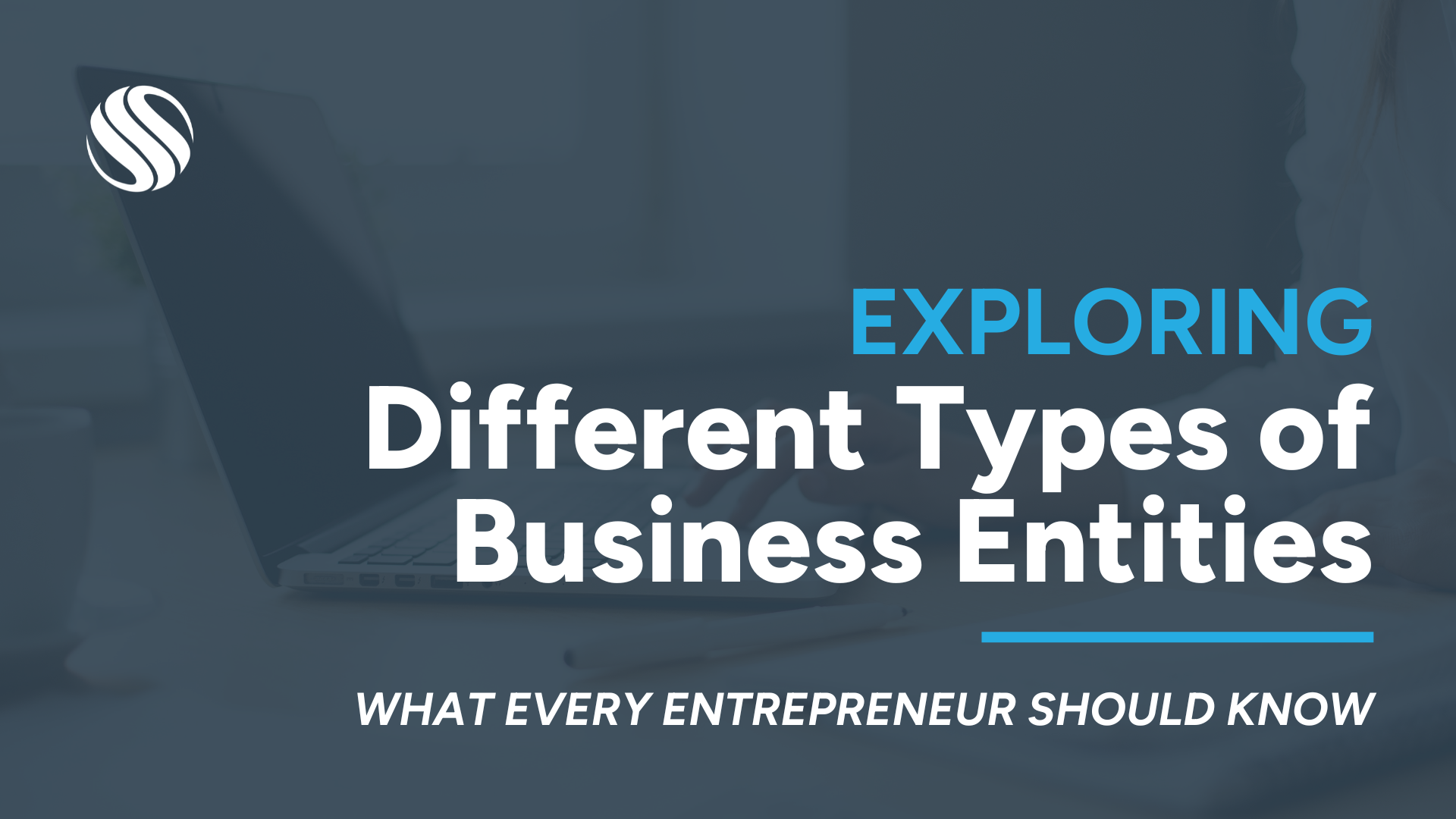
19 Apr Exploring Different Types of Business Entities – What Every Entrepreneur Should Know
By: Aimee Garneau
Choosing the right business entity is a crucial decision for entrepreneurs, as it affects various aspects of operations, taxation, liability, and governance. This article will provide an overview of the most common types of business entities including Sole Proprietorships, Partnerships, Limited Liability Company’s (LLC), S-Corporations and Corporations. Each entity type has its own set of advantages and disadvantages which are essential considerations for entrepreneurs when establishing their businesses. When starting a new venture, entrepreneurs must carefully consider the type of business entity that best suits their needs and goals. The choice of entity affects liability protection, taxation, management structure and regulatory requirements. Understanding the advantages and disadvantages of each type of entity is essential to making an informed decision. This article aims to explore the characteristics, advantages and disadvantages of Sole Proprietorships, Partnerships, Limited Liability Company’s (LLC), S-Corporations and Corporations.
Sole Proprietorships
A sole proprietorship is the simplest form of business entity, owned and operated by a single individual. It requires minimal paperwork and formalities, making it easy and inexpensive to start. This form of business entity has unlimited personal liability for the business’s debts and obligations, which often means that the owners’ personal assets can be at risk. Also, Sole proprietorships may face challenges when raising capital and expanding the business due to the limited access to financing options. Advantages and Disadvantages of this entity type include:
Advantages
- Easy and inexpensive to set up and operate.
- Complete control and decision-making authority.
- Direct taxation: profits reported on the owner’s personal tax return.
- Flexibility in management and operations
Disadvantages
- Unlimited personal liability for business debt and obligations
- Limited access to capital and financing
- Lack of Continuity: the business may dissolve upon the owner’s death or incapacity.
- Difficulty in attracting investors and partners.
Partnership
A partnership is a business structure in which two or more individuals share ownership and management responsibilities. There are two main types of partnerships: general partnerships and limited partnerships. In a general partnership, all partners have equal rights and responsibilities. In a limited partnership there are both general partners and limited partners. A general partner has unlimited liability whereas a limited partner’s liability is equal to their investment in the partnership. Below are some advantages and disadvantages of partnerships.
Advantages
- Shared management and decision-making amount partners
- Access to additional capital and resources through multiple partners
- Pass-through taxations: profit and losses flow through partners’ personal tax returns.
- Flexibility in management structure and partnership agreements.
Disadvantages
- Unlimited personal liability for general partners.
- Potential conflicts and disagreement amount partners
- Difficulty in transferring ownership interest.
- Limited ability to attract outside investors compared to corporations.
Limited Liability Company LLC
An LLC is a hybrid business entity that combines the limited liability protection of a corporation with the pass-through taxation of a partnership or sole proprietorship. LLCs offer flexibility in management structure and operational procedures, making them a popular choice for small businesses and startups. Below are some advantages and disadvantages of LLC’s:
Advantages
- Limited Liability protection for members who are not personally liability for company debts.
- Flexible management structure: members can choose to manage the LLC themselves or appoint managers.
- Pass through taxation: profit and losses flow through members personal tax return.
- Fewer regulatory requirements and formalities compared to corporations.
Disadvantages
- Complexity in formation and operations compared to sole proprietorships and partnerships.
- State-specific regulations and filing requirements.
- Potential for disputes amount members if operating agreements not well-defined.
- Limited ability to raise capital through the sale of stock.
S-Corporations
An S Corporation, often abbreviated as S Corp, is a specific type of corporation that elects to pass corporate income, losses, deductions, and credits through to their shareholders for federal tax purposes. S Corps have a requirement to file an informational tax return known as the 1120S. Below are some advantages and disadvantages of S-Corporations
Advantages
- Pass-through taxation- one of the primary advantages of S Corp is its pass-through taxation structure.
- Limited Liability Protections- typically shareholders are not personally liable for the debts and obligations of the corporation which protects shareholders personal assets.
- Ease of transferability- Shareholders can sell or transfer their shares of stock without affecting the corporation’s existence.
- Credibility and Perpetual- operating as an S Corp may enhance the business’s credibility in the eyes of investor, customers, and partners.
Disadvantages
- Restrictions on Ownership and Structure- S-corps have eligibility requirements, including limitations on the number and types of shareholders as well as restrictions on the types of stick that can be issued.
- Stricter Operational Formalities- S-corps are subject to stricter operational formalities compared to other types of entities. Requirements include holding regular board meetings and keeping detailed corporate records.
- Limited Growth Potential- the ownership and structure restrictions of S-Company limit their ability to attract investment capital and grow the business.
- State Tax Considerations- While S-Corps pass through taxation on the federal level, the corporation may still be subject to state income taxes and other state-specific requirements which depend on the state in which the corporation is incorporated in.
Corporations
A corporation is a separate legal entity owned by shareholders, with a distinct legal personality that is separate from its owners. Corporations offer limited liability protection to shareholders, which means that shareholders are not personally liable for the company’s debts and obligations. Corporations are subject to more extensive regulatory requirements and formalities than other entity types. Advantages and Disadvantages of Corporations include:
Advantages
- Ability to raise capital through the sale of stock.
- The Corporation continues to exist even if the shareholders change.
- Ability to offer employees ownership through stock options and equity incentives.
Disadvantages
- More complex and expensive to establish and maintain compared to other entity types.
- Stricter regulatory requirements, such as annual filings, shareholder meetings, and corporate governance
- Potential for conflicts between shareholders and management.
In conclusion, selecting the right business entity is a critical decision for entrepreneurs, as it impacts several aspects of the business including liability, taxation, management structure and regulatory compliance. Each entity type has its own set of advantages and disadvantages, which should be considered based on the business’s needs, goals, and circumstances. By understanding the characteristics and implications of each entity type, entrepreneurs can make an informed decision that sets their business up for success and longevity.

























